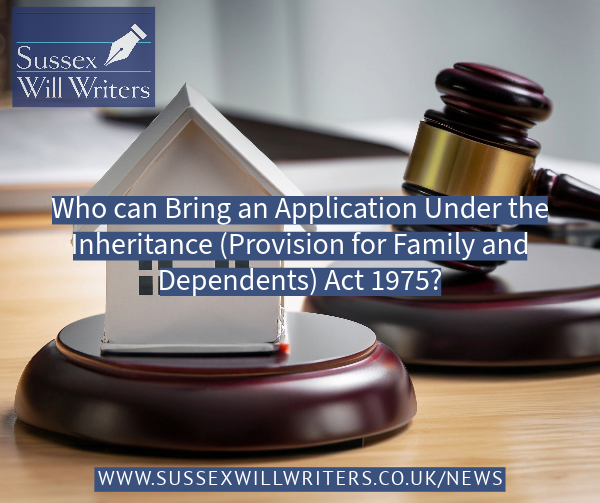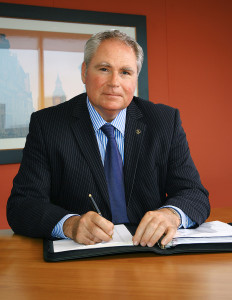
Who can Bring an Application Under the Inheritance (Provision for Family and Dependents) Act 1975?
From: The Will Company
Any person has testamentary freedom – the freedom to leave their estate how they see fit on their deaths. Despite this freedom, there are routes available where certain family members or dependants feel that they have been unfairly treated or inadequately provided for from the estate. The Inheritance (Provision for Family and Dependants) Act 1975 (the 1975 Act) is the main route available.
The 1975 Act allows certain individuals to bring an application to the court where they feel that the deceased’s estate has not provided reasonable financial provision to them. In this article, we will explore who can bring an application under Section 1 of the 1975 Act and the criteria they must meet.
Spouse or Civil Partner
The spouse or civil partner of the deceased can bring an application under S1(1)(a) of the 1975 Act. This includes a judicially separated spouse and a spouse or civil partner who has separated from the deceased, but the marriage/civil partnership has not been ended by the time of death.
Former Spouse or Civil Partner
A former spouse or civil partner who has not yet remarried or formed a new civil partnership can bring an application under S1(1)(b). It is however commonplace on the dissolution of the marriage/civil partnership for the court to bar each party from bringing an application under the 1975 Act on each other’s estates under S15 and S15ZA of the 1975 Act.
Cohabitants
S1(1)(ba) of the 1975 Act allows for a cohabitant of the deceased to bring an application. The 1975 Act defines a cohabitant as a person (who is not the spouse or civil partner of the deceased) who lived with the deceased for period of at least two years ending immediately before the date the deceased died and they lived as if they were husband and wife (or as if they were civil partners).
Children
A child of the deceased is able to bring an application under S1(1)(c). A child includes any children of the deceased en ventre sa mère mere, illegitimate children and any children adopted by the deceased but does not include a child born to the deceased but adopted by someone else. There is no age restriction under the 1975 Act for children, so both minor and adult children can bring an application.
A Person Treated as a Child of the Deceased
S1(1)(d) allows for a person who is not the child of the deceased but was treated by the deceased as a child of the family.
This was previously limited to stepchildren and former stepchildren, however since the Inheritance and Trustees’ Powers Act 2014 this has been amended to include any family in which the deceased at any time stood in the role of a parent. A family for this purpose could just be the deceased and the potential applicant. Examples of persons falling into this category could be children of unmarried partners, and children who the deceased is, or was, the guardian of.
Dependants
The final category under S1(1)(e) is any person, who does not fit into the previous groups, who immediately before the deceased’s death was maintained either wholly or partly by the deceased. Maintenance for this purpose is where the deceased was making a substantial contribution in money or monies worth towards their reasonable needs, other than for full valuable consideration under an arrangement of a commercial nature. Examples could be elderly parents or other relatives who the deceased is letting live in their property rent free.
Conclusion
Only persons who fall into the above categories can bring an application under the 1975 Act. If a proposed application does not qualify, they could not bring an application, and any attempt by them to gain provision from the estate would have to lie in other grounds, such as attempting to invalidate the will on loss of capacity or undue influence grounds, or other arguments such as promissory estoppel.
Even where a proposed applicant does fit into one of the categories, this does not mean that they will have a successful application. The court would need to consider the merits of their case on whether the deceased provided reasonable financial provision for them.
Speak to Sussex Will Writers about organising your estate, Will and Lasting Power of Attorney.
Click to Call us on 01903 533681
or get in touch by emailing: info@sussexwillwriters.co.uk
 Sussex Will Writers
Sussex Will Writers
T: 01903 533681
M: 07734 744886
E: info@sussexwillwriters.co.uk
Could you do with some FREE, sound advice on:
- Writing a Will – What do I need and how much does it cost?
- Creating Lasting Powers of Attorney – If I was incapacitated who can act on my behalf?
- Property Protection Trusts – Can these really save Care Home Fees?
- Pre-Paid Funeral Plans – With so many to choose from how do I decide which plan is best?

There is so much confusion on these vital areas of estate planning, that sometimes just a chat with an expert in the field can clear up misunderstanding and set out the way ahead, without all the legal jargon.
Or complete the form below
Steve Worsfold
Affiliate Member of the Society of Will Writers
Advising on Wills/Trusts/Probate/Powers of Attorney

Mobile: 07734 744886
Office: 01903 533681
Email: steve@sussexwillwriters.co.uk
Website: www.sussexwillwriters.co.uk
Protecting What’s Precious to You,
Now and in the Future
Sussex Will Writers is proud to support Dementia Friends,
an initiative of The Alzheimers Society
Our business is certified ‘Safe to do business with’ and ‘Code compliant’
by the UK’s largest regulatory body for Will Writers, The Society of Will Writers.
Steve Worsfold has been an Affiliate Member of the Society for 15 years.



